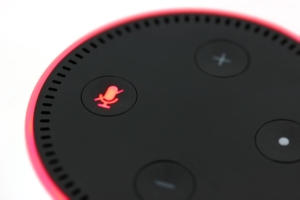How Smart Speakers Are Exposing Cheaters!
Did you know your home’s smart speaker can land you a divorce? And quickly.
The nation’s top security consultants, including myself, agree that smart devices now contain enough of your personal information to know if you’re participating in a secret relationship.
Americans are becoming more concerned with the lack of privacy associated with “smart” devices (i.e. speakers, bulbs, locks, TVs…etc.). Data advisers employed by the U.S. government have recently warned that certain data (such as taped conversations, location data…etc.) could be used against owners by uncovering unfaithful behavior.
The popular “Amazon Echo”, “Apple HomePod” and “Google Home” speakers can all pick up steamy dirty-talk among the culprits of an affair. Also, they can show when lovers commingle in the same bedroom via features such as “Alexa Guard.”

Duke Professor Dr. Machanavajjhala was recently interviewed clarifying that “Smart meters can tell you whether an individual is at home and what appliances are used. Smart light bulbs and Wi-Fi access points can reveal occupancy. Social relationships between building occupants can be inferred by analyzing sensor logs. Smart TVs and voice assistants can pick up living room chatter, some of which may be shared with third parties.”
Smart speaker adoption is beginning to become a global norm just like smart phones – making home assistants a hot industry for the biggest companies like Google, Amazon, Apple and Facebook who all produce their own versions.
But despite these devices selling rapidly, the mass public is not clear on what tech companies do with the data they collect. Companies trying to creep their way into your data is nothing new; recorded chats and locations will inevitably be used for research, stored in the cloud and used to help sell to you.
Dr. Machanavajjhala was open in admitting that he does not own a smart speaker because he is scared of them. He strongly feels speakers are a threat to his privacy. “I am waiting for privacy protections to come in. We need to know what is being collected about us, whether or not we have anything to hide,” he said.
According to TheSun.co.uk, when they asked the major companies about losing privacy with recorded conversations, Amazon was the only company who replied stating, “At Amazon customer trust is of the utmost importance, and we take privacy seriously. By default, Echo devices are designed to only capture audio after it detects the wake word. Only after the wake word is detected does audio get streamed to the cloud, and the stream closes immediately after Alexa processes a customer request. No audio is stored or saved on the device. Customers can also review and delete voice recordings in the Alexa App or by visiting www.Amazon.co.uk/privacy.” Google, Facebook and Apple did not comment.
One of the largest mysteries still today is who are they sharing our data with once it’s in the cloud? Dr. Machanavajjhala added, “Smart devices move data to the cloud so they can be analyzed using sophisticated algorithms. Once data is on the cloud, users lose control over it. There is little transparency about who it is shared with.”
One thing is for sure, you must stay up to date and informed because these companies are not slowing down.
“The Alexa service is always getting smarter, whether you’re using the Echo you bought three years ago or an Echo Show you buy tomorrow. We have thousands of engineers and scientists inventing on behalf of customers, and today we’re excited to introduce even more features…” – Tom Taylor, Senior Vice President, Amazon Alexa.
There will continue to be issues that we will face as a society when it comes to smart devices. For example, Amazon Echo had problems over holidays due to users accidentally logging into the smart phones of the individuals who gave the speakers as gifts. For the past 30 years, I have been warning that in the hands of the bad guy, your information can be used to steal money from your bank account or unlock smart locks to enter your home.
To learn more, please visit my education page complete with both paid and free content designed to help you stay safe.
Robert Siciliano personal security and identity theft expert and speaker is the author of Identity Theft Privacy: Security Protection and Fraud Prevention: Your Guide to Protecting Yourself from Identity Theft and Computer Fraud. See him knock’em dead in this Security Awareness Training video.

























